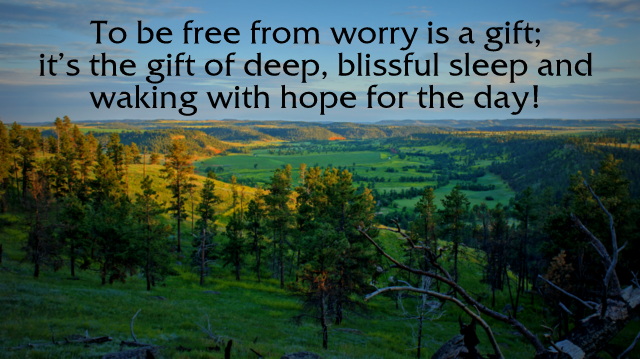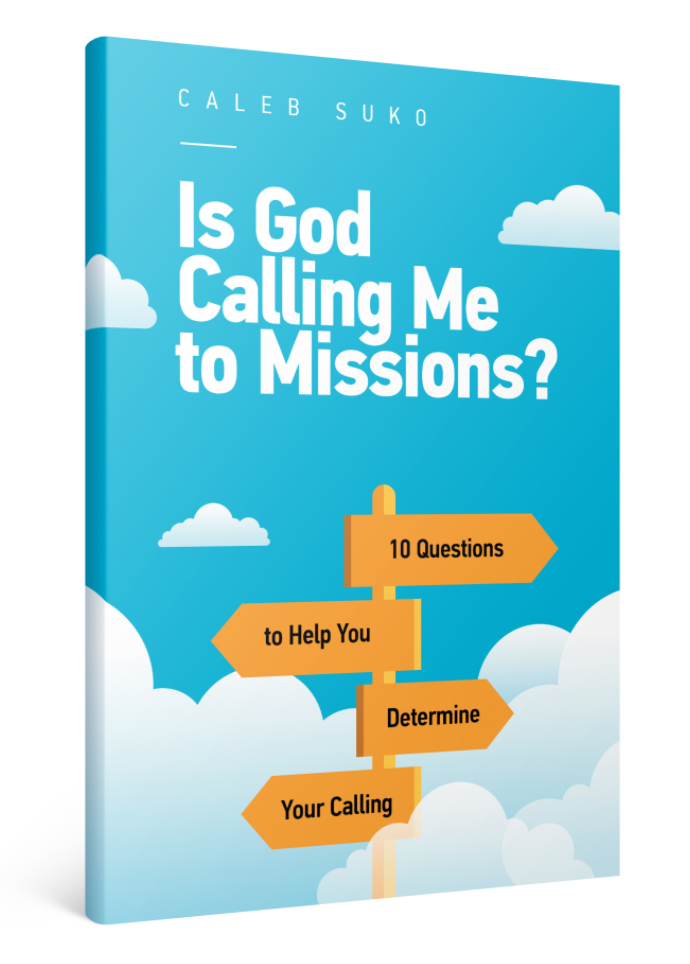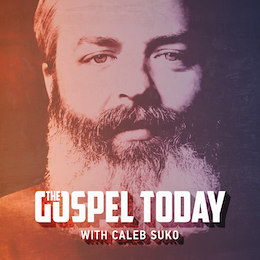To be free from worry is a gift; it’s the gift of deep, blissful sleep and waking with hope for the day!
Children possess this gift. How can a child go throughout his day without being bothered by the worries and cares of this life? There is a very simple reason – he has perfect trust that his mother and father will provide for his every need. He has never known otherwise. His parents have always clothed him, fed him, comforted him, played with him, sheltered him, and held him close in their arms. Thus, he plays with blissful ease not knowing and not caring that there is a frightfully dangerous world right outside the warm safety of his parents’ home.
Special note: This post is an excerpt from chapter one of my new book “What If… How to Kill Worry and Anxiety Before They Kill You” You can order it now on Amazon“.

With maturity comes knowledge of the outside world and responsibility. Often when responsibility comes, so does worry. Let me tell you about how it started in my life.
I’ll admit, I tend to be a pretty laid back type of guy, but appearances aren’t everything. I can worry too! A couple of years after my wife and I married, we started a small painting business. I bought one of those white utility vans with the ladder racks on top, like the telephone company uses. We lived in Tacoma, Washington, in a part of town that tended to have a lot of drug activity and the crime that goes along with it. Since we were poor seminary students, we could not afford to rent a house with a nice garage where I could park my van. That meant my work van, which was loaded with tools for my painting business, sat out on the street every night.
Honestly, I didn’t give it too much thought. I just parked the van on the street in front of our apartment building every night and in the morning it was always there waiting for me. Then one night it happened! They broke the sliding door window and very conveniently removed the contents of my van!
In the morning I got ready for work as usual and headed out the door to find a mess of broken glass on the pavement next to my van. Immediately my stress level shot up; a thousand thoughts invaded my mind and my pulse began to race! Who did this? Where are my tools? How am I going to work today? Where am I going to find the money to replace these things? What’s my wife going to say?
I began to ask questions and I began to worry. As a result, I decided to change the way I did a few things. I ordered metal bars for the windows in my van, installed an alarm, and found a nearby storage unit where I could unload most of my valuable tools at night.
Despite the fact that I had made all these changes, I still worried. For the next couple of months my ears were sensitive to the sound of car alarms. I thought every alarm was mine. Several times I got up in the middle of the night to investigate strange noises I had heard outside! Even though my van was technically more secure than it was before the theft, I was now more uneasy about things.
Let’s compare my situation with the child I described at the beginning of the chapter. The child doesn’t worry because he trusts his parents. However, he also doesn’t worry because he lacks knowledge of the dangers of the outside world. Before the break-in, I was like the child.
Yes, I knew that it was theoretically possible for someone to break the window and steal my tools, however, it didn’t worry me because I hadn’t personally experienced it. The lack of personal experience kept me ignorant of the real danger and allowed me to “sleep like a baby” every night. The problem is that once I went through the experience, it was impossible to go back to the previous state of ignorance.
Sleeping Through the Storm
Now let’s take a minute and look at Jesus. Here’s a guy that could sleep through anything! Remember when Jesus went out on the lake with the disciples? Jesus was sleeping right through a powerful storm that was threatening to sink their boat!
And as they sailed he fell asleep. And a windstorm came down on the lake, and they were filling with water and were in danger. And they went and woke him, saying, “Master, Master, we are perishing!” And he awoke and rebuked the wind and the raging waves, and they ceased, and there was a calm.
(Luke 8:23-24)
There’s no question that the disciples were worried in this passage. They didn’t gently tap Jesus on the shoulder and say, “Master, if you’re not too tired, we could use a little help now.” They repeatedly called for him, “Master, Master!” They made the situation look dire, “We’re going to die!” They didn’t just tell him, they kept telling him!
The disciples couldn’t sleep in the storm, but Jesus could!
What was the first thing Jesus said to the disciples after he woke up? You’d think he’d say something like, “Wow, you weren’t kidding – that really is a terrible storm!”, or maybe he’d say, “Sorry for sleeping, guys; but don’t worry – everything will be OK now.”
Jesus’ response must have shocked the disciples.
He said to them, “Where is your faith?” And they were afraid, and they marveled, saying to one another, “Who then is this, that he commands even winds and water, and they obey him?”
(Luke 8:25)
After rebuking the wind and the waves, Jesus turns right around and rebukes the disciples for their lack of faith. It was the absence of faith that kept them on edge, didn’t allow them to sleep, and caused them to wake Jesus in their desperation.
Babies sleep like babies because they haven’t yet experienced all the dangers and problems in life. Their worry-free sleep is what we sometimes call “blissful ignorance”. On the other hand, Jesus could sleep despite the fact that he knew there was a storm going on. Jesus could sleep because he had perfect trust in the Father.
You and I don’t have the luxury of sleeping in blissful ignorance. If you’re old enough to read this book, then you are old enough to know that there are very unpleasant things in this life, things that can keep you up at night.
We’ve had painful experiences, or heard about others who did, and now we want to avoid them. As our minds struggle to find a way out, to protect us from the dangers of life, we can easily slip into a pattern of worry.
Worry rarely starts suddenly. It begins small and innocent; it’s almost hard to recognize at first. We want to look for solutions to possible problems, we want to avoid difficult situations; pain, sickness, and death. This is not wrong. However, our desire to avoid the difficult and distressing things of life can quickly lead to unwarranted fears and a destructive fixation upon the problem and the possible results.
No, worry doesn’t usually start suddenly, but when it’s not dealt with, it will eventually drag your mind into a deep pit of fear, anxiety, and apprehension. The deeper you go into this pattern of thought, the harder it will be for you to dig yourselves out. It will seem impossible for you not to think about it. Your mind will play through the possibilities over and over again. You become restless, irritated, feeling like you need to do something but not knowing what to do.
Worry infests the mind like maggots, destroying us from the inside out! It paralyzes us with fear, fills us with doubt, and crowds out our ability to think logically and rationally.
There is really only one way out of the pit worry and that is up! Jesus gave us a great example as he slept through the storm. He also pointed us to the only real hope that we have, the only thing that has the ability to rescue us from the depths of our worry!
A Call for Faith
Jesus reprimanded the disciples for their lack of faith, their failure to believe, their inability to trust. The faith that Jesus was talking about is not a general faith that is often referred to in today’s popular culture. It is not faith in some higher good or simply having a positive outlook in life. It most certainly is not faith in yourself, in your abilities or talents. Jesus called us to a faith much higher than ourselves. He called us to believe in the only thing that can actually lift us from our worries and set us on solid ground.
Jesus called for faith in himself!
After all, he had just proved that he was able to calm the storm with his words. Who has power like that?
When it comes down to it, worry is nothing more than your mind desperately looking for a solution to all your problems. When you come to Jesus, you find the ultimate solution. Your tired mind can stop searching; Jesus is the complete answer!
Don’t get me wrong, Jesus doesn’t promise that when you put your faith in him that he will protect you from all pain and hardship in this life. His promise is much greater! He promises to give you a hope that reaches beyond this momentary life, he guarantees a joy and peace that is much deeper than your temporary struggles. He promises to take your worries upon himself and free you from their weight, but this can’t happen until you begin to trust him!
If you’re like me, then you have gone through things in your life that could give you reason to worry. You can’t un-experience what you have experienced and you can’t un-know what you have learned, so that leaves you with only two possibilities. You either choose to make worry an everyday part of your life, or began a life of trust in Jesus and start sleeping well again!











Rick Dawson
July 23, 2014True for many children – likely a majority somewhere – but it was not true for my siblings and I, not by a long shot. I worried about whether or not my dad would beat one of us – or my mother – badly enough to actually put us in the hospital on way too many occasions. Kids who grow up in alcoholic or addicted homes are not terribly different from kids who grow up in a war zone – just pointing out another aspect of reality.
The scriptural truths? All still true – but Jesus wasn’t the one having to pick His way through broken glassware and mirrors to get to the kitchen to fix breakfast, hoping on the one hand that we wouldn’t slice our feet open, and also that the combatants that were our parents would keep sleeping, and wake in better moods, less likely to hurt us. Sometimes? Worry *does* start suddenly, and turns pathological – but that’s for a different post, and while I don’t live there anymore (thanks to God), I remember the zip code.
Caleb
July 26, 2014Thanks for sharing that insight from your very painful personal experience. You’re right. Children can worry and so my illustration does fall short in the type of situation that you described.
As far as worry starting suddenly, my observation is that worry can appear suddenly, as it did in my life, but the reality is that it had roots in our life before that, which were unnoticed.
Thanks for sharing Rick!
Micah
July 23, 2014Experience and ignorance. Worry and bliss. Fear and trust. This excerpt unpacks these things so so well, and really brings home what faith really means. i.e. For our trust to not be based on events and circumstances. To not be predicated on the absence of problems but rather the presence of a person. It’s a great example of the difference between childishness and childlikeness and how to move from one to the other. Great read.
Caleb
July 26, 2014That’s a very important distinction between childlikeness and childishness. I think that often we mistake one for the other. Thanks for reading Micah!
Thomas Mason
July 23, 2014I started worrying when the very thing, the person, to whom trust would be given, proved not to be the person that trust should have been given to. Thereafter, mistrust was the name of my game to not only that person, but to any person who failed, disappointed, or not delivered on the promises that were made.
Caleb
July 26, 2014Unfortunately people can and will fail us. Sometimes that’s a fine line to walk, to know when to trust and when to use wisdom and caution. Thankfully Jesus will never betray our trust!
Floyd
July 24, 2014Worry is definitely a tool of the enemy, I guess that’s why there are so many scriptures on the subject. The gift of our senses betray us, they are miraculous, but they can blind us to what the real Truth is. Worry is fear, and fear is not from God… When we fear the world instead of revering our Father, it is a slap in His face and is comparable to putting our faith in idols. To fear is human, to revere the One who is in control of His creation is divine.
Caleb
July 26, 2014Worry and fear really are connected! I think we often don’t realize this. I have a chapter in my book that directly addresses fear too!
Heather @ My Overflowing Cup
July 24, 2014I love this, Caleb. Thank you so much for sharing it. Ironically, it has been in my most difficult storms that I have learned to truly trust Jesus. We have been through financial struggles as of late that have caused worry and anxiety like never before. I realized that I had no choice but to truly and completely give them over to a God who is big enough to handle them for me. Otherwise, I could see that the waves would have completely overcome me. It is truly in my weakness that His strength shines through. Thank you for the beautiful reminder that worry is sin because it means that we don’t trust God.
Caleb
July 26, 2014Financial worries can be terribly crippling! I have a chapter in my book that specifically addresses that! Trusting God to provide when things are tight can stretch and grow our faith in ways we never expected.
Caleb
September 4, 2014Anonymous in WA, you bring up a good point. The truth is that often there are moments in our life when we feel hurt, cheated or that justice was not done! These things can cause us to question God’s goodness and his love for us. Ultimately when we feel this way there is one thing that we need to do! We need to bring our minds and our lives back to TRUTH! The great thing about truth is that it doesn’t depend upon our feelings, emotions, or limited perspective. The truth that God gives us in his Word is always true no matter how we may feel!
It’s important to realize that feelings can deceive us. We might feel that God has failed us but that doesn’t mean that he has. We may feel that God is far away but that doesn’t mean that he is. We may feel that there is no hope but that doesn’t mean that there isn’t.
Whenever we struggle with these types of feelings we must come back to God’s Word and remind ourselves of those foundational truths about God’s nature and character.
I think you’ll find it helpful to read the Psalms. Often times you can see this same struggle in the life of the psalmists. However, they always come back to the truth of who God really is.
I recommend you read Psalm 136.